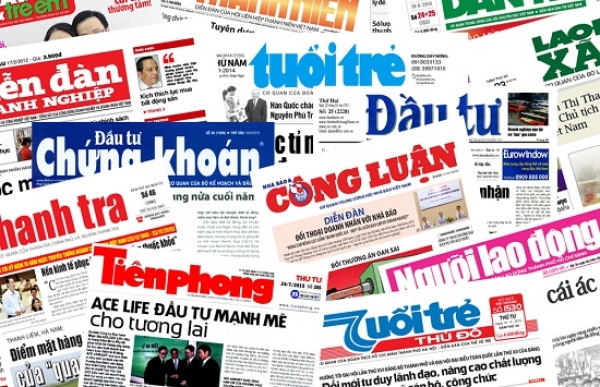Journalists and issues of social supervision and criticism
(LLCT) - In order to clarify the subjective, internal issues of the activities in social supervision and criticism, 600 questionnaires were used for the topic and 568 valid ones were collected in Hanoi, Quang Ninh, Ho Chi Minh City and Can Tho as the surveyed areas. The surveyed subject was journalists - the direct entity of press activities(1), and it was carried out in 2014.
The surveyed sample groups were those who work in the fields of journalism such as press managers, reporters, editors, lecturers, and learners. The seniority in the press field of the study sample is rather high, so a clearer view on the actual status of the awareness and attitude of the journalists towards the issue of social supervision and criticism of press can be provided.
To collect qualitative data, as addition to the quantitative study, our team interviewed 16 experts in the journalistic field(2) and conducted extensive interviews with nearly 60 journalists, and held 4 group discussions at 4 areas under study.
The interviews focused on five basic issues: (1) the perception and roles of pressmen in the performance of social supervision function, (2) evaluation of the effectiveness of social supervision done by the Vietnamese press over the past time, conditions required to improve the social supervision by the press, (3) perception of social criticism, and the role and unique qualities of the Vietnamese press in performing the function of social criticism, (4) evaluation of the effectiveness of social criticism done by the Vietnamese press over the past time, advantages, difficulties and conditions required to improve the effectiveness of the press, (5) advantages, difficulties, and legal conditions, etc., solutions to strengthening the social supervision and criticism function of the press.
1. Journalists’ awareness of social supervision
For the group of objects who directly take part in press activities in the four surveyed regions, similarities in their conception of social supervision can be seen. Accordingly, the two contents which are mentioned the most by the journalists are monitoring the development, promulgation, implementation and enforcement of the guidelines, policies and laws of the Party and the State and monitoring civil institutions (culture, economy, education, law, etc.). For other contents, the identification rate just is just approximately 50%.
Besides, a type of study data is also very noteworthy when awareness, view on the social supervision object of the press is learnt (Table 1).
Thus, there is a major difference between the Northern journalists and the Southern colleagues. While Southern journalists have the high opinion of the superivising role over political organizations and individuals (i.e.: supervising the enforcement of public power of the organizations and individuals in the administrative apparatus), the press in the North pays attention to supervision over the mass media and people’s activities.
As for the social supervision function of the press, the journalists in Ho Chi Minh City believe that social supervision is the monitoring of citizens over the State and state organizations, as well as the monitoring, evaluation, and analysis of the activities carried out by agencies and organizations. This shows that the view of the press in the economically most dynamic region in the country lays out the transparency to the social organization and management mechanism. This is the objective demand of the communication industry in the tendency of democratization of social life.
Meanwhile, the press in the North pays attention to supervising, evaluating, and analyzing the activities of individuals and citizen groups. Hence, the socio-political environment has a great influence on the awareness and views of journalists.
The common point in the awareness of the studied groups is that they have not considered that the social supervision of the press mainly focuses on monitoring the power enforcement of the organizations, agencies and officers in the public authority apparatus as well as social supervision over the enforcement of laws, public policies and the community benefit-related guidelines and policies.
The group of journalists who were extensively interviewed about the second issue (supervision effectiveness and conditions to improve it) often give rather sufficient and systematic lists of the influential factors in the social supervision effectiveness of the press: (1) the awareness, professional qualifications, political stuff, professional ethics and responsibilities of journalists, (2) the awareness, level of the public, (3) the legal environment, and the policies of the State, as well as the guidelines and policies of the Party.
Concerning the question: “What factors do you think have strong effects on the social supervision effectiveness of the press in Vietnam?” (possibly the advantages and difficulties), most of the journalists have the belief that the factors affecting the social supervision effectiveness of the press include: (1) the nature of information and information sources, (2) the guidelines, policies, laws of the Party and the State, (3) the views of the press agency leaders, (4) performance and reliability of the press, (5) level, competence and professionalism of journalists, (6) the impacts of economic, cultural, social, legal environment factors and so on.
This is a limit and this may be caused by the issue of social supervision in Vietnam in general and social supervision of the press in particular, which is still new to us and just at a starting point.

2. Journalists’ conception of social criticism
The conception of social criticism shared by journalists is identified mostly in the following contents: (1) social criticism is the proposal of solutions to overcoming shortcomings, backwardness and stagnation (73.9%), (2) social criticism is the expression of views on some social issues (71.1%), (3) social criticism is the criticism of, and fight against negative phenomena in society (70.7%). It means that the press becomes a forum or means for the community to express their critical opinions and fight against negative practices and corruption.
In terms of the social supervision function, the journalists, reporters who are working at the press agencies - the surveyed sample objects - consider the provision of truthful, objective, and multi-dimensional information as the most important function (accounting for 79.5%).
In addition, the most chosen contents include following events, reporting quickly, analyzing the main problem correctly, arousing and promoting the social awareness and responsibilities of citizens, protecting the right and individuals against the negative.
When the areas are compared, a sharp difference in the views of the pressmen in Ho Chi Minh City and those in the rest three regions can be seen.

Table 2 shows that the pressmen in Ho Chi Minh City pay a lot of attention to the role of preventing and fighting corruption, fighting for justice and improving the knowledge and awareness of people. In particular, the anti-corruption role is interested twice compared with Hanoi and Quang Ninh, 7 times compared with Can Tho. Survey results indicate that the press group in Ho Chi Minh City have a rather clear awareness of social supervision and criticism in order to mostly deal with the beneficial relationship and fight against power abuse in task performance.
When the press circles in the areas of Hanoi and Quang Ninh are considered, the statistics show that their location near the central government causes their reluctance to mention the issues of anti-corruption, rather they concentrate on social roles such as preventing negative social phenomena or creating social concensus and solidarity.
In fact, social supervision often goes along with social criticism. This is the organic, dialectical relationship with close interaction. Is the evaluation of the involved groups on social criticism in Vietnam compatible with social supervision? (Table 3).
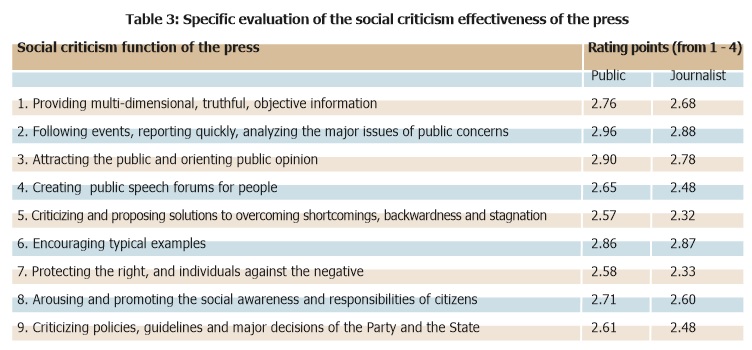
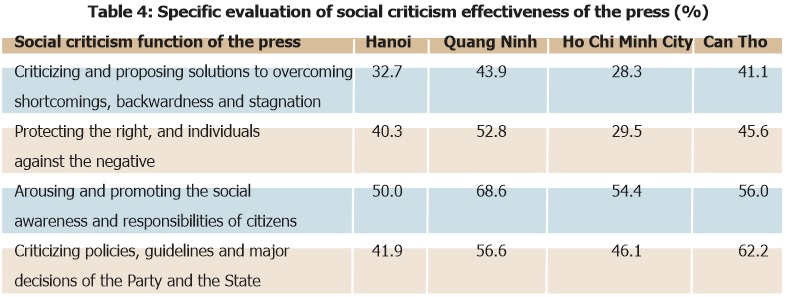
Thus, social criticism of the Vietnamese press is appreciated more than social supervision, with the maximum of 2.96 points.
The three best-performing activities are the items 2, 3, 6, with rating points from 2.78 to 2.96.
The social criticism activities which are not much appreciated are items 5, 7 with the point range of from 2.32 to 2.58.
In comparison of the two object groups, the evaluation of the public is higher than that of the journalist group.
When the areas are taken for comparison, the press circles in Hanoi and Ho Chi Minh City have closer evaluation than those in Quang Ninh and Can Tho, in terms of social supervision effectiveness of the Vietnamese press over the past time (Table 4).
From the above statistics, it can be said that, despite the differences in views on social criticism function of the press, the journalists in Hanoi and Ho Chi Minh City also show frank evaluations and admit the limitations of the press in social criticism over the past time. Meanwhile, the press circles in Quang Ninh and Can Tho have a more optimistic and positive view on the social criticism functions of the press.
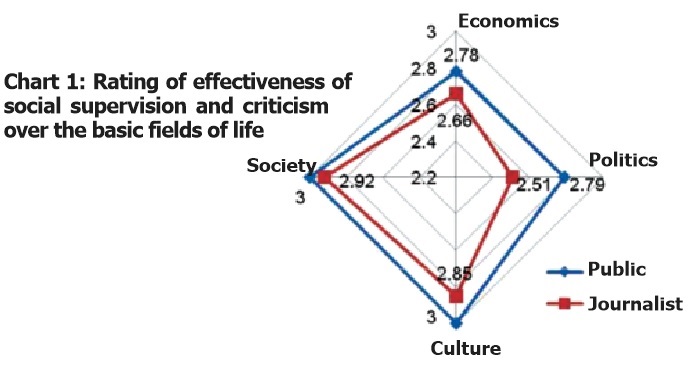
Chart 1 shows that the involved objects have good and distinguished evaluation of the social supervision and criticism roles of the press over most of the basic fields, from economics, politics to culture and society. The rating of social supervision and criticism in the field of culture and society is the highest of 3.0.
In consideration of the two studied samples, the rating of effectiveness of the journalist group in the political field is not high (2.51 points). This shows the limitation of the press in social supervision and criticism over the political field or State authority.
For more detailed evaluations, the evaluation of the specific roles of the press in sensitive activies such as preventing and checking the degeneration of political thought, bureaucracy and corruption, and promoting the social democratization process should be delved into.
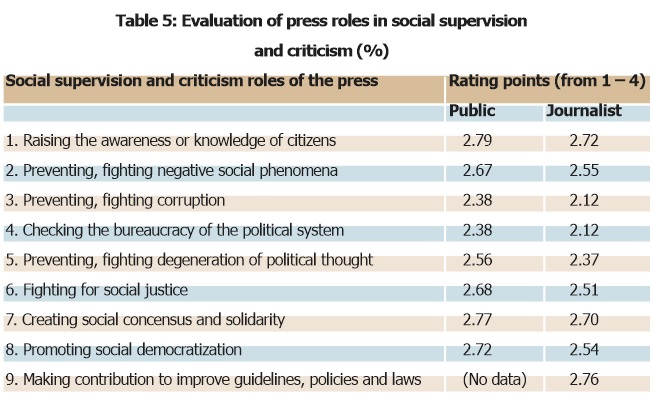
Table 5 shows that the roles which are much appreciated are mostly linked to the social field. They include contents 1,7,9. The achieved points are in the range of from 2.70 to 2.79.
In contrast, the little recognized roles are items 3, 4. The achieved points are low, just in the range of from 2.12 to 2.38.
Positive evaluations on the roles of the press for social supervision and criticism of the journalists in Hanoi and Ho Chi Minh City is lower than those in Quang Ninh and Can Tho. Particularly, the number of journalists in Ho Chi Minh City showing dissatisfaction with the social supervision and criticism of the press makes up the lowest rate.
3. Factors affecting the press’ competence, effectiveness in social supervision and criticism
Objective factors
The most influential factors affecting the social supevision, criticism and competence of the press is the institutional environment and the legal framework for the press to operate. The two most influential factors affecting the activity and effectiveness of social supervision and criticism of the press are: (1) the extent of democratization of the socio-political environment; (2) the mechanism for social critism of the press remains unclear and unrespected.
Journalists consider the legal environment as the most important factor. Meanwhile, the public figure out that the ineffectiveness of the press in social supervision and criticism is influenced by (1) press commercialization trend, (2) taste of a number of readers for “rags”. From the above results, this difference can be noted as follows: for journalists and press agencies, posting sensitive information or reporting a negative issue in publications is, sometimes, not easy, especially for the local press. For the target of social supervision and criticism, the risk of confronting with legal provisions, public authorities, interest groups, or senstive relations is very high. The Vietnamese press is State organs; in practice, it can be placed under the control of any person in power. Hence, despite reporting on negative practices, even with sufficient evidence, the combativeness of the press is sometimes much rather affected in the undermining direction. For a person in authority can make use of the name of his organization to restrain the information, and such restriction is not for the benefit of the organization itself, or of the Party, the State or the people, but for individuals’ or group’s benefit.
Hence, the legal environment, economic motivation or the taste of the public in product reception are the objective factors which have considerable effect on the social supervision and criticism function of the Vietnamese press over the past time.

Subjective factors
Through the survey, it can be seen that more than 50% of the interviewees think that they have not contributed or have made limited contribution to the social supervision and criticism role of the press; about 43.1% reckon that they have made considerable contribution. Activities that are considered the most contributary include: (1) providing and reporting truthful, objective information, (2) following events and reporting on them in time.
However, a lot of activities necessary for social supervision and criticism receive little attention from the journalists such as directly investigating, or revealing negative cases, protecting individuals against the negative, creating a public speech forum for people, criticizing and proposing solutions to dealing with shortcomings, backwardness, and stagnation.
As such, the activities of journalists in promoting the social supervision and criticism role of the press are still limited. Their capability to fight, criticize, and construct as well as their capability to connect with society in supervising, evaluating, analyzing criticism of the journalists are not focused. The cause is that many journalists still lack professional mettle to perform these difficult and dangerous tasks (60% choose this reason).
This is understandable because social supervision and criticism always pose challenges, difficulties, or even danger for press agencies. Therefore, the bravery of journalists is considered as one of the prerequisites for the operation of social supervision and criticism, especially the mettle and professionalism of the head of the press agency.
The subsequent factors having influence on the social supervision and criticism competence of the press are the attitudes of the leaders of the press agency (73.1%) and level of competence in critism of journalists.
Thus, the effectiveness of social supervision and criticism of the press depends very much on the head of the press agency. As the operator and the one who holds responsibilities before law and the public for the publicized information and contents, the head of the press agency often faces major pressure from the line agency, press managing agency, reflected objects, individuals and organizations having related rights and obligations, public and social opinion. Therefore, the degree of the press agency and/or journalists’ participation in social supervision and criticism is significantly subjected to the view and attitude of the press agency head.
The level of competence in critism of journalists is the significant factor affecting the effectiveness of social supervision and criticism of the press. This is the fact that press agencies, especially journalists, have to face.
Two subjective factors which limit journalists’ capability to participate in social supervision and criticism are (1) “helplessness” and (2) intervention into or influence on the press agency from the outside.
The survey results show that the sense of responsibility, obligation and professional ethics are always the motivation for journalistics to keep their “professional ardour” and remain enthusiastic and pro-active in promoting directly or indirectly social supervision and criticism of the press. Beside, the topicality and thorniness of the raised socio-economic issue, public pressure, and public opinion also drive journalists to participate in this effort.
4. Solutions to improving the competence and effectiveness of the press in social supervision and criticism
Firstly, improving the legal environment
Strengthening the validity of the Press Law is deemed to be the most important legal solution to improving the social supervision and criticism competence of the press. This solution is highly agreed by the two sample groups of the public readers and journalists (the support rate is 64.3%).
The Party and State have promulgated a variety of documents stipulating the functions, tasks, power, content and method of social supervision and criticism of the organizations in the political system as the basis for the press to connect the resources and strength of society in order that the competence and effectiveness of social supervision and criticism can be enhanced. However, it is necessary to improve the legal environment, mechanisms and policies to create conditions for the press to operate and promote its social supervision and criticism more and more effectively, respect the democratic rights of the people, praise and award journalists who have publications of highly social criticism in time.
Secondly, improving quality, competence of the journalists
There are two groups of essential solutions to raising the competence of journalists in social supervision and criticism: (1) enhancing the training of political mettle and social responsibility of journalists and (2) raising the professional standard or expertise of journalists. Both of these groups reached the consensus of up to 75% - 80%. Beside that, responsibilities and political mettle, and the command of law and legal, ethical, social, political responsibilities of journalists need to be improved. “Journalists must possess competence in social supervision and criticism if we want to improve the competence of the press in social supervision and criticism.”
Thirdly, strengthening the roles of public readers, press and communication
With regard to the aspect of press - communication competence in the context of digital media environment, the social supervision and criticism competence of the press is still dependent on the public’s competence in social supervision and criticism. The public are exact representation of the press. It is because the press agency only performs this role well through the organization and organization of social supervision and criticism resources from the public and public opinion. Among them include the competence in establishing, developing relations with the public and public opinion, experts, scientists, socio-cultural activists on a large scale. It is because social criticism is mostly the criticism from experts, or well-versed intellectuals, and social supervision is mostly supervision through “seeing and hearing” of the people.
l Endnotes:
______________________
(1) In the article “Social Supervision and Criticism of the Press with regard to Public Opinion” published in Issue 2-2017, the author presented study findings on ideas, awareness, and attitude of the public towards the press.
(2) Journalist Huu Tho, Journalist Ha Dang; Mr. Vu Quoc Hung, Mr. Truong Minh Tuan, Mr. Do Quy Doan, Mr. Hoang Huu Luong, Mr. Nguyen The Ky, Mr. Pham Ba Thinh, Mr. Nguyen Cong Khe, Mr. Pham Tat Thang, Mr. Ho Quang Loi, Mr. Nguyen Quang A, Mr. Dinh Van Huong, Mr. Nguyen Thanh Loi, Mr. Tran Ba Dung, Mr. Phan Quang.
Assoc. Prof., Dr. Nguyen Van Dzung
Academy of Journalism and Communication
Journal Archives
Journal Archives
Media
Photo Gallery
Contact us


